 MyDogBreeds
MyDogBreedsPharaoh Hound is originated from Malta but Molossus is originated from Greece. Pharaoh Hound may grow 13 cm / 5 inches shorter than Molossus. Pharaoh Hound may weigh 28 kg / 61 pounds lesser than Molossus. Both Pharaoh Hound and Molossus has almost same life span. Both Pharaoh Hound and Molossus has almost same litter size. Pharaoh Hound requires Low maintenance. But Molossus requires Moderate maintenance
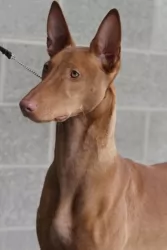 The Pharaoh Hound hails from Malta and is the national dog there. These dogs are rare and are looked upon as endangered. Because they are a primitive type dog, they enjoy good health.
The Pharaoh Hound hails from Malta and is the national dog there. These dogs are rare and are looked upon as endangered. Because they are a primitive type dog, they enjoy good health.
It has always been used as a hunting dog for rabbits. The dog has been recreated from mixing a combination of other breeds. It certainly seems to be an ancient dog breed, having existed for more than 2 000 years.
It is thought that the dog was imported to Malta by Phoenician traders. The dog has been classified as a member of the sighthound group, and arrived in England in the 1930s and to the USA in 1967. The breed was also officially recognized by the American Kennel Club in 1984.
The Molossus has always been a popular dog and they have been around since ancient times. Mastiff type dogs are termed as Molossus.
Of course, when looking at the origin of the dog, there are many unsubstantiated claims about it. It has always been believed that the Molossus was a Mastiff-type dog, ferocious in battle. The Romans were dog breeders and recognized that the Molossus was a talented dog – good at guarding and herding.
Over the centuries the dog has changed but it is believed it was a Mastiff-type dog with a number of other breeds included in its origins such as the Rottweiler, Pug, Bulldog, Great Dane, Alano Espanol and Saint Bernard.
The Molossus isn’t a dog breed itself but rather a category that other dogs belong to. Today there are Molosser clubs and Molosser shows around the world.
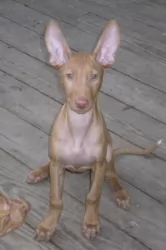 The Pharoah Hound is an elegant looking dog standing at roughly between 53 and 63cm and weighing 18 to 27kg.
The Pharoah Hound is an elegant looking dog standing at roughly between 53 and 63cm and weighing 18 to 27kg.
They are sleek dogs without any bulkiness about them and the coat is tight fitting with short smooth hair. The coat is a tan or red color, the eyes bright and the color of amber. The ears are fairly large and erect and the long tail slim with sometimes a white tip. The skin can be thin so the dog can be sensitive to the cold.
The neck of the dog is long and lean, as are the legs. An interesting aspect with this dog is that when the dog becomes excited its ears and nose become bright pink.
Pharoah Hounds are calm dogs and they can live in the city or in the countryside. They love kids and will be a wonderful playmate for them. Once he has had a lot of exercise and play, he is the kind of dog that will settle down happily with his human family for some quiet time.
Just as with any other dog, he will require training and socialization to make him obedient and better behaved.
This Ancient dog breed from Greece has different descriptions of what it really looked like. It seems to have always been large to medium sized dog standing in the region of 50 to 76cm in height and weighing anything from 25 to 55kg.
The coat is mostly short and smooth and can be in a host of different colors. They are large boned dogs, solidly built with medium sized floppy ears, a short, thick neck, short, broad muzzle and a long tail which was later docked.
Molossers typically have heavy bones, pendant ears, and a relatively short and well-muscled neck, with a short, broad muzzle. These Molossers have always been used for a variety of jobs where strength, perseverance, speed and braveness are required. They have been used as rescue- and guard dogs, protecting livestock from predators.
The Molossus dogs all have the same kind of characteristics which have been bred into them. From their working days, they are known for their tremendous courage, taking on wild animals to protect their livestock.
They are territorial, wanting to protect their human family and home from intruders.They have also been bred to be loyal, loving family pets, and being highly affectionate, they want to be involved in the activities of the family.
This breed is gentle and loving, social and active and gets on well with other pets in the home as well as with children. They’re intelligent dogs and will need to be trained and socialized to ensure they are obedient and amicable with visitors to the home.
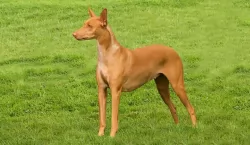 The Pharaoh Hound is quite interesting in a number of ways and he is independent, strong-willed and able to entertain and amuse himself.
The Pharaoh Hound is quite interesting in a number of ways and he is independent, strong-willed and able to entertain and amuse himself.
He loves to join in with the children and be part of their games. He’s intelligent and easily trained and he is also low maintenance.
While he’s not the most attractive dog to many people, others look at him as a true beauty. Whatever your opinion is, he will still make you a good family friend.
The Molossus, contrary to what many people think, isn’t a vicious dog, but rather a good natured dog that makes a wonderful family pet.
These dogs are known also for being hard working dogs with characteristics of bravery. They are dogs who may look fairly tough, but they are actually gentle, calm and sensitive. It’s a bad upbringing from the owners that gives any dog bad characteristics.
Train your Molossus, have him socialized and be a responsible and loving dog owner, and these dogs promise to make you a splendid family pet.
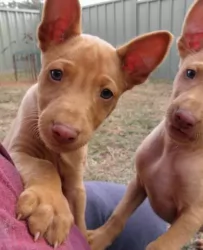 Pharaoh Hounds are uncommon outside of the Maltese Islands and with very little irresponsible breeding, these dogs are virtually free of genetic diseases. A common dog illness to look out for includes -
Pharaoh Hounds are uncommon outside of the Maltese Islands and with very little irresponsible breeding, these dogs are virtually free of genetic diseases. A common dog illness to look out for includes -
Your Pharaoh Hound can suffer from patella luxation, and in more severe cases it can be painful and even be disabling for a dog. This ailment comes about when the kneecap is dislocated from its normal position. You’ll find your dog lifting his hind leg quite a bit. Unfortunately this problem can lead to arthritis developing.
Other illnesses to look out for are bloat, cancer, skin allergies and ear infections.
These large dogs are particularly prone to health issues such as hip dysplasia, a genetic condition. A poor diet as well as environmental factors can contribute towards the disease too as well as rapid weight gain and obesity.
This disease develops because the dog’s hip joints haven’t developed properly. The hips then partially dislocate, and the dog has pain and battles to get around. If your dog shows signs of hip dysplasia, he will need to get to the vet to do a physical exam and come up with a treatment- and management program.
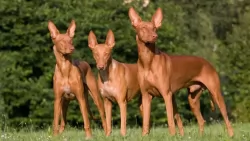 The Pharaoh Hound’s short coat is easy to groom and it will require a brushing at least twice a week just to get rid of loose hairs.
The Pharaoh Hound’s short coat is easy to groom and it will require a brushing at least twice a week just to get rid of loose hairs.
At the same time trim his nails, check inside his ears for infection and look inside his mouth for any rotting teeth.
Your Pharaoh Hound is an active, energetic dog and he will need a good dose of exercise every day. Take him with you on your walks or allow him to join you with your hikes, jogging or cycling. At home involve him in some ball games.
How much any adult dog eats will depend on a number of factors such as size of dog, age and his activity levels.
You get some excellent dog kibble these days on the market but the idea is to choose one of the high quality ones which have minerals and vitamins in them. Home-made food is also good for your pet and this should be kept simple, consistent and nutritious.
Every now and then you can add in some boiled chicken, brown rice or pasta and sweet potato, carrots and spinach to the kibble. Some raw meat added in can also be of benefit to your dog’s health.
Stay away from spicy, exotic foods and keep your dog's food easy like suggested so as to avoid digestive problems
These dogs were bred to be working dogs and they have always spent their time outdoors performing a guarding or rescue role. Today they require a lot of exercise – walks and ball games – as they are dogs with a lot of energy.
Essentially a large breed, the Molossus will need a commercially manufactured food of high quality if you opt to make use of the convenience of these foods.
Make sure to choose one manufactured for large breeds and which is free of a host of bad ingredients such as corn, soy, wheat, dairy, artificial colors, sweeteners and preservatives.
You want dog food which is high in protein and fat. Try and include some home-cooked food such as boiled chicken, brown rice, pasta and vegetables. An ingredient to look out for in your dog’s food is omega-3 fatty acid to help keep the skin and coat shiny and healthy. Puppies particularly benefit from DHA, or Docosahexaenoic acid, a form of omega-3 fatty acid that is good for brain development.
Brushing the dog’s coat twice a week will be necessary to remove loose hairs, especially during the shedding period. When you brush him, check for ticks and fleas and speak to your vet about flea treatment if necessary. Ears and eyes should be checked and cleaned regularly.